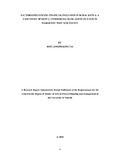| dc.description.abstract | The relationship between financial development and growth has been studied
extensively by researchers in the past decade. The World Bank and other financial
institutions have declared that by 2020, all world population need to have bank
accounts for social economic development. Agency banking is one invention aimed at
ensuring financial inclusion of rural people towards promoting development.
However, statistics from Kenya Bankers Association (2010) shows that almost 50.0%
of the population in rural areas have bank accounts. Therefore, the purpose of this
research was to establish factors influencing financial inclusion of rural population in
Marakwet West Sub County. The objectives of the research were to determine how
financial education, infrastructure access, network connectivity and agent quality
influence financial inclusion by KCB agents in Marakwet West Sub County. The
study was guided by agency theory. The study was conducted in Marakwet West Sub
County KCB Mtaani agent outlets. The study used a survey research design approach.
Information from Kapsowar KCB branch shows that 156 agents had been registered
by December 2014. The manager at Kapsowar KCB Branch acted as a key informant
for the research. The sample size involved 113 respondents who were selected
through simple random sampling technique. Data was collected through use of
questionnaires and interviews. Validity, piloting and reliability procedures were
undertaken to ascertain the instruments are effective. Data collected were analysed
using descriptive and inferential statistics. Results of the research are presented in
tables. The study found out that the four factors; financial education (r=0.126),
infrastructure (r=0.642), network access (r=0.434) and agent quality (r=0.195) were
significant factors (p<0.05) influencing financial inclusion for rural development in
Marakwet West Sub County. The study recommends that financial education should
be regularly provided not only to agent operators but also to residents from all corners
of the study area, there is need for KCB to consider adjusting float management levels
by some outlets as some said that were under-performing due to ceilings set by the
bank. The study findings will be significant to commercial banks (especially KCB) in
improving their agency banking services, development partners (World Bank, IMF)
and future researchers. | en_US |

